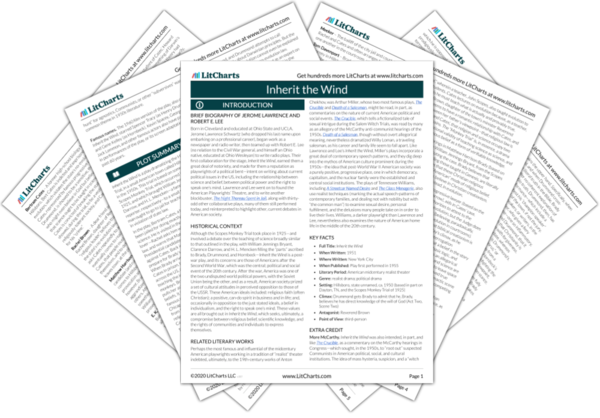Inherit the Wind contains an overlapping network of characters perceiving themselves to be underdogs (or “Davids,” in the Biblical story of David and Goliath), who pit themselves against more powerful figures of authority (“Goliaths”). Bertram Cates is the novel’s first “David.” He has placed himself in opposition to the law of his state, for the sake of an idea—that science ought to be taught in a science classroom. If Cates is a David, then, the whole of the state, and especially Brady, are the Goliaths to which he is opposed. And Brady is, physically, a Goliath—he eats prodigiously, speaks loudly, and wins over audiences with torrents of words. But Brady compares himself to David (I.1), saying that Drummond, his opposition, is Goliath, since Drummond is a successful attorney himself, who has managed to succeed in the courtroom against overwhelming odds.
Drummond, for his part, seems also in the position of an underdog, once the trial proceeding gets underway. The Judge, in the beginning, appears to take the prosecution’s side, and does not allow Drummond to call expert witnesses in the sciences. Rachel is an “underdog” as regards her relationship with her father, the fiery preacher Reverend Brown, who is the town’s serious religious “authority.” After the trial, when Cates is convicted but fined only a paltry amount, Rachel decides to leave her father, and Hillsboro, with Cates, starting a new life elsewhere. She therefore escapes her father’s religious and moral authority.
In the Biblical story, David conquers Goliath through his ingenuity. In the play, too, the “underdogs” tend to triumph, although only the “true” underdogs. In other words, Brady turns out not to be a “David” figure after all—he, a clear Goliath of American religion and politics, appears ridiculous on the stand, and after the trial, when the verdict is reported, almost no time is reserved for Brady’s speech. Brady then dies, unexpectedly, and Drummond, though happy that Brady’s views have been shown to be ridiculous and erroneous, nevertheless celebrates the strength of his opponent’s belief. Cates, for his part, has “lost” the trial but won the war—his views have been made public, and championed, through Drummond’s efforts and Hornbeck’s reporting.
More broadly, the opposition of “underdog” and “authority” is shown to be too simplistic, by the play’s end. Each side tends to conceive of itself as the “underdog”—Christians believe they are in the minority; followers of Darwinian evolution believe the whole country has lined up against them. In truth, Cates, Drummond, and many Americans in the fictional world of the play, and in the US after the Scopes Trial, fall (or fell) between these two camps—they believe in religion and think science ought to be taught in schools. These are not relationships of underdogs and authorities—rather, in the play and in American life, there are two complementary systems, religious and scientific, each coexisting with the other.
David vs. Goliath ThemeTracker

David vs. Goliath Quotes in Inherit the Wind
I understand your loyalty, my child. This man, the man in your jailhouse, is a fellow schoolteacher. Likeable, no doubt. And you are loath to speak out against him before all these people. Think of me as a friend, Rachel. And tell me what troubles you.
You make it sound as if Bert is a hero. I’d like to think that, but I can’t. A schoolteacher is a public servant: I think he should do what the law and the school-board want him to.
Does Mr. Drummond refuse this man [Dunlap] a place on the jury simply because he believes in the Bible?
If you find an Evolutionist in this town, you can refuse him.
If you’ll stick by me, Rache—well, we can fight it out.
Can they make me testify?
I’m afraid so. It would be nice if nobody ever had to make anybody do anything. But—Don’t let Brady scare you. He only seems to be bigger than the law.
I know it’s warm, Matt; but these night breezes can be treacherous. And you know how you perspire.
In this community, Colonel Drummond . . . the language of the law is clear; we do not need experts to question the validity of a law that is already on the books.
In other words, the court rules out any expert testimony on Charles Darwin’s Origin of Species or Descent of Man?
The court so rules.
Now tell me. Do you feel that every word that’s written in this book should be taken literally?
Everything in the Bible should be accepted, exactly as it is given there.
The jury’s decision is unanimous. Bertram Cates is found guilty as charged!
I feel I am . . . I have been convicted of violating an unjust law. I will continue in the future, as I have in the past, to oppose this law in any way I can.
He that troubleth his own house shall inherit the wind: and the fool shall be servant to the wise in heart.
We’re growing an odd crop of agnostics this year!
I’ll tell you Brady had the same right as Cates: the right to be wrong!
You see, I haven’t really thought very much. I was always afraid of what I might think—so it seemed safer not to think at all. But now I know. A thought is like a child inside our body. It has to be born. If it dies inside you, part of you dies, too!











